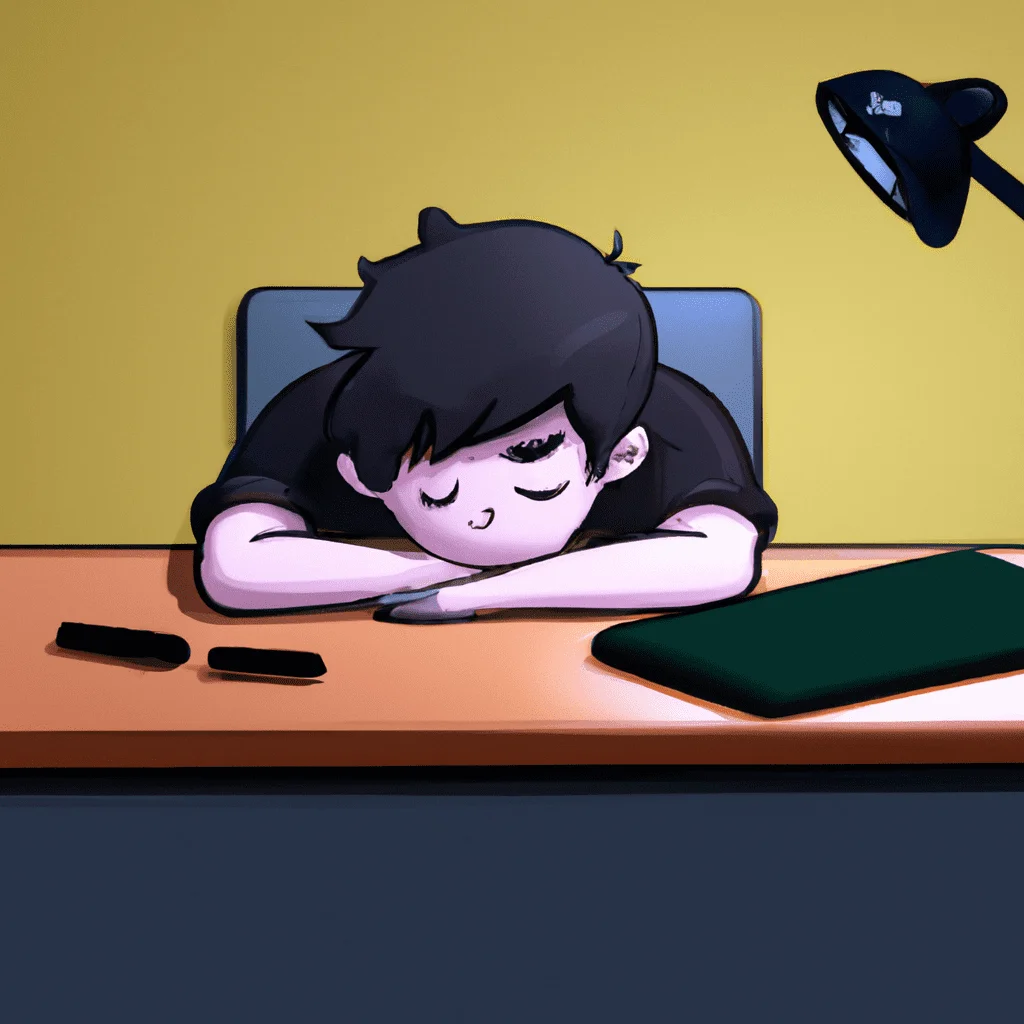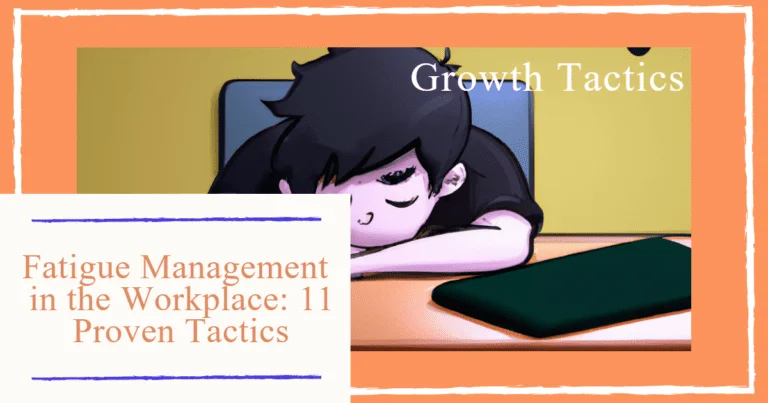Fatigue management is an important part of everyday life, especially for those who work long hours or have physically demanding jobs. While it’s impossible to completely avoid fatigue, there are techniques and strategies you can use to manage your fatigue levels.
Whether you’re a student trying to stay energized through long lectures, or a truck driver managing long hours on the road, fatigue management is an essential skill to master. Here we will discuss what fatigue management is and how you can take steps to manage your fatigue more effectively.
Jump To Section
What are the effects of fatigue in the workplace?

Fatigue is a state of physical or mental exhaustion. It can have negative effects on an individual’s ability to think clearly and make decisions, as well as their physical performance.
The consequences of fatigue can be significant in the workplace. When employees are tired, they are less likely to be alert and attentive to their surroundings. This can lead to mistakes, missed opportunities, and even accidents.
These are all things we would like to avoid for ourselves and employers want to avoid them because they all affect a business’s bottom line.
Causes of workplace fatigue
Fatigue in the workplace isn’t just about feeling tired. It runs deeper. Let’s break down what’s draining our energy and resources, and find ways to act purposefully and effectively.
Common Culprits
Long Hours
When we push ourselves beyond normal working hours, we compromise our energy and efficiency. Remember, leadership isn’t about burning out. It’s about sustaining your strength for the long haul.
Poor Sleep
Lack of quality sleep saps our willpower. Respect your need for rest as much as any other leadership skill. Proper sleep is foundational to maintaining high performance.
High Stress Levels
Stress is an energy thief. Identifying and managing stressors is crucial. Use your stress management tools proactively.
Additional Factors
Poor Ergonomics
Your workspace should support you. Ergonomics matter. Arrange your environment to prevent physical strain and enhance productivity.
Noise Levels
A noisy environment distracts and tires us. Create a space where you can focus, and remember that proper communication often includes creating quieter moments for thought.
Bright Light Exposure
Bright lights, especially at odd hours, can disturb your body’s natural rhythms. Adjust your lighting to support your energy levels, not drain them.
What is fatigue management?
Fatigue management is the process of monitoring, managing, and reducing the effects of fatigue on yourself or your employees in the workplace. Fatigue can have many negative effects on an employee’s health and safety, productivity, and overall enjoyment at work.
Proper fatigue management can help to prevent these negative effects and make working conditions more comfortable for both employees and employers.
Tips for managing fatigue

Below you will find some of the most important tips for managing fatigue in the workplace.
Learn to recognize fatigue
It is important to start recognizing the signs of fatigue. Some common signals of fatigue include difficulty concentrating, feeling irritable, mood changes, poor performance at work or school, and increased craving for sleep.
It is also important to be aware of how fatigue can affect your overall health and well-being. For example, chronic fatigue syndrome (CFS) is a serious condition that can seriously impact a person’s quality of life. To avoid getting into a cycle of fatigue, it is important to take breaks and recharge.
Understand your Circadian Rhythm?
Everyone has a circadian rhythm or the natural body clock that controls when we feel awake and alert. The rhythm’s speed is partly determined by daylight and night-time exposure to light. For the most part, everyone goes through cycles throughout the day of high energy and low energy. For example, some people are typically most productive in the morning but crash after lunch.
Circadian rhythm affects energy levels, mood, concentration, sleepiness, and many other bodily processes. To optimize performance, it is important to do your vital tasks during times of higher energy levels and less important tasks at times of lower energy levels. If you understand your cycle you can use it to get more done.
Have a good work-life balance

Work-life balance is crucial to happiness. It can be difficult to find a perfect balance, but it’s worth it to be able to enjoy your life outside of work.
There are a lot of things you can do to make sure you are maximizing your work-life balance. First, try to avoid working long hours. If you need to work long hours, try to spread them out throughout the week instead of cramming all of your hours into one day. Also, make sure you have a set schedule for when you are available and don’t feel pressure from your employer to stay late or take on extra tasks.
Another way to promote work-life balance is to take time for yourself every day. This could mean taking a short break after work or going for a walk in your free time. Spending time with family and friends is also important, and you should never feel guilty about taking time for yourself. In the end, finding the right balance is something that takes some trial and error, but it’s worth it to be able to enjoy your life outside of work.
Utilize employee wellness programs
Employee wellness programs are a great way to promote healthy habits in your workforce. Programs that are offered at your company can vary, but many of them include exercises, food and drink choices, stress management techniques, and more. It is important to try out different programs to see what works best for you.
Optimize work schedules
There are many things to consider when trying to find a work schedule that works for you. Some factors to consider include your preferences, the type of work you do, and the company you work for. If you are allowed to use flexible work schedules, try to make use of them as much as possible. This way, you can get the most out of your days and still meet your goals.
Take rest when you need it
Taking rest when you need it is one of the most important aspects of fatigue management. Oftentimes, we can feel overwhelmed and stressed and don’t have the time or energy to take a break. But taking a break is crucial for our overall productivity.
By breaking up our workday into short, scheduled breaks, we can recharge our batteries and return to work with fresh energy. Taking rest is also important for our overall mental health. When we’re busy, stressed, and overworked, it’s easy to become isolated from friends and family and develop depression or other mental health problems. Taking short breaks throughout the day can help us maintain healthy relationships and get more enjoyment out of life.
Practice good posture

When you stand or sit up tall, you are more likely to feel better and have more energy. Good posture helps reduce fatigue and can make you more successful in your activities.
The benefits of good posture vary depending on your age and activity level. For example, good posture helps keep your back healthy and reduces pain in the neck and shoulders. Poor posture can even lead to health problems such as sleep apnea.
Start by trying to adopt simple habits, like standing up straight when you’re talking on the phone or sitting up when you work at your computer. Over time, you can work on more challenging poses, like keeping your chin lifted when you read or leaning back when you listen to music. And finally, don’t forget to relax! A good way to do this is to take a few minutes each day to do something calming, like deep breathing exercises or yoga poses.
Stay organized in work and life
Being organized in work and life can have many benefits. For example, it can help you stay focused and productive. It can also make it easier for you to compete with others. However, being organized isn’t always easy. You may need to establish rules and habits to maintain your organization.
Exercise regularly
Regular exercise helps to improve energy levels and reduce fatigue. A study published in the journal “The Lancet” found that people who exercised for at least 20 minutes a day had a reduced risk of developing chronic fatigue syndrome (CFS). This will help you to feel more in control and empowered.
Practice better sleeping habits
If you want to improve your work performance, it is important to get enough sleep. A good night’s sleep is essential for your overall health and well-being.
To get a good night’s sleep, try to go to bed and wake up at the same time every day. This will help you to get into a regular sleep schedule.
When trying to improve your sleep habits, it is also important to avoid stimulants such as caffeine and nicotine before bedtime. These substances can make it difficult to fall asleep and can also cause you to wake up in the middle of the night.
Eat healthier
Eating healthier is not only good for your body but can also help you feel more energetic. One way to do this is to make sure you’re including plenty of fruits and vegetables in your diet. These foods are packed with antioxidants, which can help reduce the risk of diseases like cancer. Additionally, what you put in your body affects your energy levels. If you’re eating unhealthy foods, it can lead to low energy levels and a feeling of lethargy. Instead, try to stick to nutrient-rich foods that will give you the energy you need to get through the day.
Did you enjoy this article on fatigue management? Please share and subscribe below.


